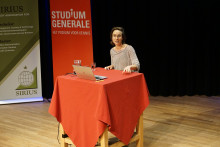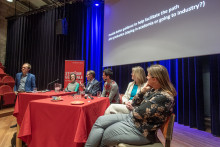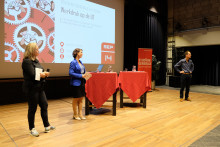Heavy on history, Breuker’s lecture started by discarding the common misconception of North Korea as a communist regime. He suggested, instead, that the country is capitalistic at its core. ‘You’re not looking at a state. You’re looking at a conglomerate of capitalist companies.’
The Leiden University’s professor explained that after the collapse of the North Korean social system in the 90s, the country re-emerged as a monolithic leadership concerned mostly with making money at any cost.
Where does the money come from?
Aided by techniques of physical and psychological control that keep each citizen ‘ideologically reliable’, North Korea’s economic activities include the state-supported production and export of weapons and drugs.
But Breuker’s recent research shows that one of the largest sources of North Korea’s income is tied to the export of human labor. Between 100,000 to 200,000 North Koreans are currently working in dozens of countries including China, Russia, and Poland. These workers get little to no pay, work under extremely bad conditions, and endure, in Breuker’s words, ‘a slave-like existence’.
The stakes are too high
‘North Korea is one of the most pressing problems of the world in terms of human rights,’ Breuker warned yesterday. Although people think these issues are far away from home, Breuker suggested their influence is quite close. To his own surprise, Breuker’s research revealed human trafficking happening within the European Union, tying forced labor even to the building of Dutch ships.
'We underestimate them because they look funny'
Amongst other pressing threats, the professor listed the regime’s possession of nuclear and chemical weapons, along with their willingness to sell it to other countries like Syria and Iran. ‘We underestimate them because they look funny,’ he warned, ‘North Korea may seem like a pariah state to us, but it has many friends around the world.’
‘Keep the eye on the ball’
Referring to the Korea’s joint participation in the Winter Olympics, Breuker advised we don’t fall for the Northern neighbor’s trick of showing their pretty cheerleaders instead of their guns. ‘Keep the eye on the ball, there is no money in sports diplomacy.’
Breuker suggested we continue to expose the networks of human trafficking across the globe, go after the money of North Korea’s leaders, and keep giving voices to exiles and refugees who can uncover the blatant abuses to human rights perpetrated by Kim Jong Un’s regime.
‘It’s a scary situation, but it can improve,’ said Breuker, who hopes for the reunification of the Koreas and who, despite the horrors his research has unveiled, remains optimistic. When asked why he dedicated his career to such frightening topic, he answered ‘knowing the things I know, I cannot not do anything’. His response echoes what he was constantly reminding yesterday’s audience: ‘Never lose sight of the human face of North Korea.’







